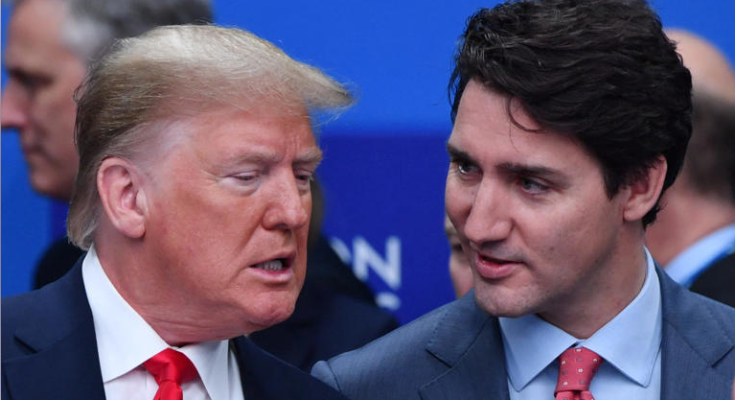
President-elect Donald Trump’s recent announcement about a 25% tariff on goods from Canada and Mexico is raising significant concerns within the automotive industry. The tariffs, which are set to take effect after he takes office in January, could disrupt the well-established cross-border manufacturing and supply chains and lead to higher prices for cars and SUVs imported into the US.
Impact on Trade Relationships
Mexico is currently the United States’ largest trading partner, accounting for nearly 16% of total trade during the first three quarters of this year. Canada follows closely behind, contributing approximately 14.5% of the country’s trade. With decades of cooperative trade agreements in place, these tariffs are expected to create significant challenges for businesses that depend on the seamless movement of goods across borders.
One of the industries most vulnerable to the proposed tariffs is the automotive sector. Mexico alone exports more than 2.3 million cars annually to the United States, according to Commerce Department data. Both foreign and domestic automakers — including Ford, GM, and Nissan — have spent billions of dollars over decades to build and maintain an efficient supply chain that stretches across North America.
 Canadian Prime Minister Justin Trudeau focused on his country’s longstanding trade relationship with the US when asked about President-elect Donald Trump’s tariff threats.
Canadian Prime Minister Justin Trudeau focused on his country’s longstanding trade relationship with the US when asked about President-elect Donald Trump’s tariff threats.
Potential Price Hikes for Consumers
While a 25% tariff on imported vehicles does not automatically translate to a corresponding increase in car prices, industry experts warn that automakers operating on already thin profit margins will struggle to absorb these additional costs. If manufacturers pass the costs on to consumers, the price of many vehicles could rise significantly.
Large retailers such as Walmart and Best Buy have already warned that consumer prices are likely to climb if businesses have no choice but to pass on rising costs. The automotive sector, which relies heavily on cross-border parts transportation, may be hit especially hard. Many car parts cross the US-Mexico and US-Canada borders multiple times throughout the production process, making tariffs particularly costly.
Responses from Automakers and Industry Representatives
So far, representatives from major automakers such as Ford, Honda, and the American Automakers Policy Council, which represents Detroit’s Big Three automakers, have not issued any official statements regarding the proposed tariffs. Companies like Nissan, Stellantis, General Motors, and Toyota have also declined to comment.
The timing of this development is particularly problematic for American consumers and the auto industry alike. The average cost of a new car has already surged by over $10,000 since 2019, reaching more than $48,000, according to market data. Meanwhile, automakers are grappling with slowing demand for electric vehicles (EVs), leading to layoffs and plant closures across the country.
Dozens of Affected Models
The National Highway Traffic Safety Administration has identified dozens of vehicles manufactured in Canada and Mexico that are currently sold in the United States. These models range from popular pickups to luxury SUVs and electric vehicles. Some of the vehicles potentially affected by the tariff hikes include:
- Pickups: Popular trucks from American and international automakers, many of which rely on Mexican manufacturing plants.
- Luxury SUVs: Canadian facilities are known for producing high-end SUVs for the US market.
- Electric Vehicles: Mexico and Canada have become critical hubs for EV production, which may face increased costs if tariffs are imposed.
What’s Next for the Auto Industry?
The automotive industry is already undergoing a seismic shift, with increased investments in EV production, supply chain disruptions from the pandemic, and rising material costs. The potential introduction of tariffs further complicates the landscape, with automakers potentially forced to reevaluate production strategies and cost structures.
As the situation unfolds, all eyes will be on the response from automakers and the administration’s willingness to negotiate trade agreements that could mitigate the potential fallout. Consumers, meanwhile, are bracing for the possibility of even higher prices in an already expensive car market.
- Canadian Prime Minister Justin Trudeau on Saturday announced retaliatory tariffs against the US.
- Canada will impose a 25% tariff on US goods, some effective Tuesday and others in 3 weeks.
- The tariffs came after Donald Trump implemented 25% tariffs on Canadian goods imported to the US.
Canadian Prime Minister Justin Trudeau on Saturday announced retaliatory tariffs against the US in response to President Donald Trump’s tariffs on Canadian imports, which were implemented earlier in the day.
“Tonight, I am announcing Canada will be responding to the US trade action with 25% tariffs against 155 billion dollars worth of American goods,” Trudeau said during a press conference. “This will include immediate tariffs on $30 billion worth of goods as of Tuesday, followed by further tariffs on $125 billion worth of American products in 21 day’s time to allow Canadian companies and supply chains to seek to find alternatives.”
Trudeau said the tariffs will apply to everyday items shipped from the US to Canada, including alcohol, fruits, clothing, and shoes, as well as major consumer products like household appliances and furniture, and materials like lumber and plastics.
“And as part of our response, we are considering with the provinces and territories several non-tariff measures, including some relating to critical minerals, energy procurement and other partnerships,” Trudeau said.
Canada Responds to Trump’s Tariffs Amid Trade Tensions
Canada has announced retaliatory measures in response to President Donald Trump’s decision to impose 25% tariffs on Canadian imports. The move, which Trump described as part of his efforts to address the fentanyl crisis in the United States, has sparked criticism from Canadian officials.
However, a 2022 report by a congressional commission on synthetic opioids contradicted Trump’s justification, indicating that Canada is not a major source of fentanyl or other synthetic opioids entering the US.
Trudeau Calls for Cooperation, Not Conflict
During a press conference on Saturday, Canadian Prime Minister Justin Trudeau, who recently announced his resignation as leader of the Liberal Party, addressed the escalating trade tensions. Trudeau revealed that he had not spoken with President Trump since the latter’s inauguration on January 20 but assured the media that he remains open to negotiating improved trade relations.
“If President Trump wants to usher in a new golden age for the United States, the better path is to partner with Canada, not to punish us,” Trudeau emphasized. “Canada has critical minerals, reliable and affordable energy, stable democratic institutions, shared values, and the natural resources you need.”
Trudeau highlighted Canada’s readiness to work collaboratively with the United States to strengthen the North American economy. “Canada has the ingredients necessary to build a booming and secure partnership for the North American economy, and we stand at the ready to work together,” he stated.
Tariffs Add to Economic Uncertainty
The tariffs are expected to strain bilateral trade relations and could negatively impact key sectors reliant on cross-border commerce, including automotive manufacturing, natural resources, and technology. Canadian officials have voiced concerns that such measures may undermine decades of cooperative trade agreements that have benefited both nations.
Trudeau’s remarks underscored the importance of maintaining strong economic ties between Canada and the US, urging collaboration over conflict as the best path forward for shared prosperity in North America.
Representatives for the Trump administration and Trudeau’s office did not immediately respond to a request for comment from Business Insider.
Late Saturday, in response to Trump’s trade moves against the country, Mexican President Claudia Sheinbaum also announced retaliatory 25% tariffs on imported US goods, per Reuters.
BI previously reported economists predict the Chinese government will respond similarly, with retaliatory tariffs, limiting exports of raw materials used for semiconductor production, or other changes to its trade policies to squeeze the US economy.



